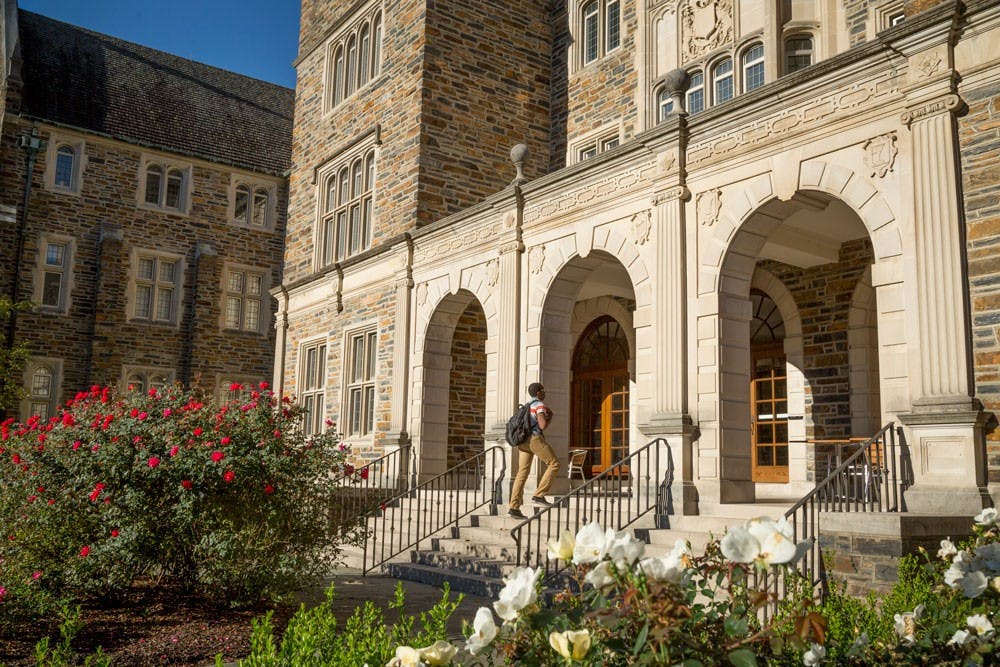In the midst of many lost opportunities due to the pandemic, Duke’s work-study program has persisted by making adjustments to align with new safety regulations.
Work-study programs, run through the Karsh Office of Financial Support, allow students to work at part-time jobs on campus, the wages from which can then be used to pay for a portion of tuition. Around 46% of Duke students receive need-based financial aid, and work studies are a common form of this aid.
Miranda McCall, interim director of financial aid for the Karsh Office of Undergraduate Financial Support, wrote in an email that the work-study program has seen changes due to COVID-19, especially in terms of where students are working.
“As many of our classes went virtual, so did some of our jobs,” McCall wrote. “We have students working remotely for the first time in numerous offices, but we have fewer students working in reception roles in what were previously high-traffic community spaces due to COVID restrictions.”
McCall added that along with changes in location, there was a decrease in the overall number of students as well as fewer work-study jobs offered by campus employers as a result of the coronavirus.
“In a typical year, about 27% of students who are offered work study participate in the program. This fall, we saw only about half of that population in work-study jobs,” McCall wrote.
First-year Sarah Bailey participated in the work-study program this semester. She worked as a gardener in the H.L. Blomquist Garden of Native Plants—part of the Sarah P. Duke Gardens—where she weeded and planted saplings.
She also said that although her work in the Gardens seemed similar to a normal semester’s work, there were a few differences.
“On the days it rains, instead of being able to go to the Gardens and work inside the head house, I’m not allowed to work inside any of their facilities,” Bailey said. “My boss calls it ‘cleaning seeds’: she gives me dried flowers, and I take them back to my dorm, pick them apart and pull out the seeds so that they can be preserved.”
Because the Gardens were closed to the general student body for much of the semester, Bailey said she appreciated the opportunity to spend time there.
“It’s so magical. That’s so cheesy, but you can hear the leaves rustle, and the birds, and the squirrels, and it’s just very peaceful,” Bailey said. “It’s nice, after spending a long time on Zoom calls and studying in my room, to have the opportunity to be outdoors and do something with my hands, not thinking about anything serious or academic, but working on a project like weeding out a garden bed for a while.”
First-year Benjamin Johns worked as a helper in the Bryan Center mailroom. He said he sorted mail into boxes, handed people their packages and completed “day-to-day administrative organization.”
“It hasn’t been terribly different due to COVID because of the nature of how we do things. It’s not a very see-people job,” Johns said.
Johns said one of the main differences is that students have to now space out when they wait in line for their packages. There have also been changes to how packages are delivered.
“FedEx and DHL packages now come [to the mail center] instead of going straight to people’s dorms, so we have a lot more to go through,” Johns said.
First-year Jocelyn Chin, another student taking advantage of the work study program, works with the Duke women’s basketball team as a student manager. She helps out during practices by doing tasks such as setting the clock, cleaning the court, and passing and rebounding the ball during shooting drills.
Chin said managers took additional safety measures this semester to prevent the spread of COVID-19 within the team, such as wiping down and disinfecting the balls after every practice and making sure everyone in the gym wore a mask, with the exception of the players.
“Usually the seats on the benches where the players sit during games are in one row and touching, but at the scrimmage this past weekend they were spaced out,” said Chin, also a columnist for The Chronicle, Nov. 19.
Despite being in close proximity to the team for hours of practices and scrimmages, Chin said she feels confident in her safety in the gym.
“All the athletes at Duke get tested every day, and the managers get tested every day too since we’re on the court with them,” Chin said. “I know I’m safe because my test results tell me literally every day.”
Get The Chronicle straight to your inbox
Signup for our weekly newsletter. Cancel at any time.
Alison Korn is a Pratt junior and enterprise editor of The Chronicle's 118th volume.

